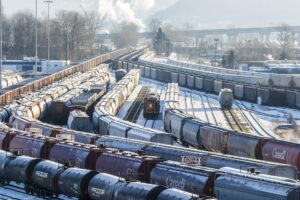The Importance of Diesel and the War in Ukraine
Diesel is the lifeblood of the economy and the Trucking Industry. It keeps heavy machinery running and trains, ships, and trucks on the move. In fact, diesel fuels most of the farming, mining, and construction machinery in the United States and powers the technology that moves more than 76% of the cargo. With this in mind, it’s easy to imagine how a fuel shortage can disrupt and paralyze the economy and result in higher prices for fuel, transportation, and everything else for that matter.
This problem also predates the war in Ukraine as diesel inventories had already fallen to extremely low levels in America – the lowest in 14 years. A strong recovery from the pandemic put increased demand on supply chains and the war further exacerbated these problems related to the fuel shortage.
Although the government has tried to cushion some of this cost during the year, the fuel shortage remained and the price of diesel continued to rise. Trucking companies have also tried to shoulder some of the burden with these costs but there is only so much they can do. As a result, the rising price of diesel continues to disrupt supply chains and increase the cost of transportation.
The end result is essentially higher prices for transportation and virtually every type of product and service. For instance, customers are not only paying higher prices at the pump for fuel but also for food, drink, appliances and any other item which requires transportation. But that’s just part of the story…

How Diesel Prices are Affecting the Trucking Industry
The trucking industry continues to suffer in the face of diesel shortages and higher fuel costs. Supply chains are undergoing an immense real-life stress test and owners are reportedly struggling to make gains on regular jobs. In fact, diesel supplies have reached their lowest levels in 20 years and even truck drivers have been expressing concern about supply issues due to shortages.
With the increased consumer demand, there is also increased demand on supply chains and further pressure on the rising price of diesel. But you might think this extra-demand is resulting in record profits in the trucking industry?
The truth is, it’s a no-win situation for trucking companies because diesel is a critical expense that cannot be cut. Sure, these companies are investing in the future of electric trucking but there is still some way to go before electric trucking can take over. In other words, for now, trucking companies must fill the tanks with diesel in order to deliver orders and keep up with the demands of customers. The price of diesel has sky-rocketed in recent times which means that trucking companies are not able to profit in the same way as before.
The diesel crisis is therefore forcing trucking companies to make difficult decisions. Increased consumer demand has put further strain on supply chains and required many business owners to cut back on expenses and rethink their logistics.
Unfortunately, these companies will even need to pass on business because there is simply too little potential for profit. You might even say this high demand is like a double-edged sword as these businesses need the cash flow but they can only take on work that will benefit the bottom line.
And what does the future hold for the trucking industry?
Final Thoughts
As for when the diesel crisis will end, nobody has a crystal ball but it does seem as though markets are poised for high energy prices in the year ahead. While the government has tools to help cope with rising costs, these measures only alleviate restraints and don’t tend to the problems that cause the actual fuel shortages.
The war in Ukraine is the obvious example and the reason why trucking companies are best to focus on reducing costs and finding alternative ways to get things done. It’s true, nothing lasts forever but a challenging road lies ahead and trucking companies will need to continue refining and improving their transportation systems while paying the higher price of the lifeblood that keeps them on the move.















